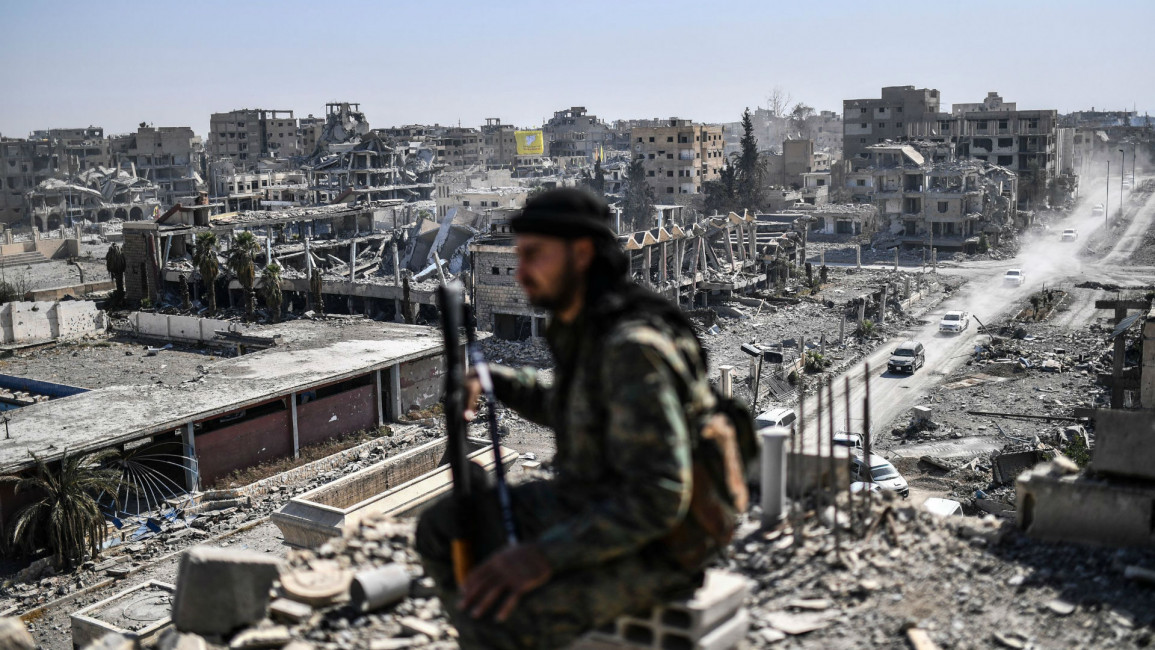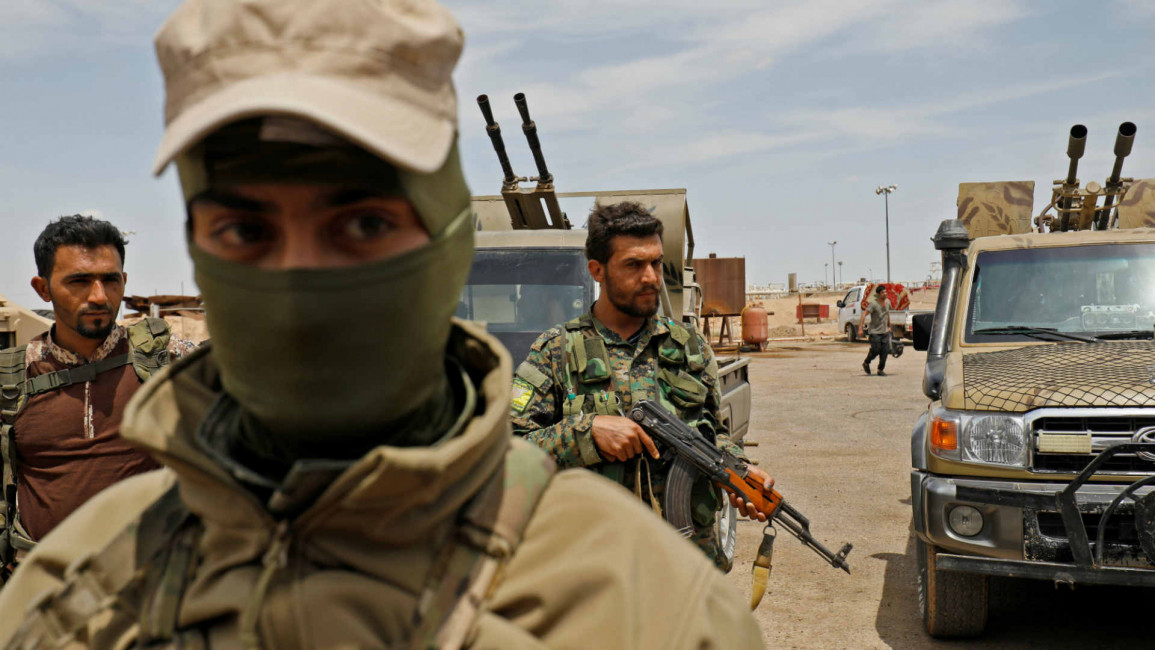
Why US sanctions waivers in northeast Syria could fight poverty but harden divisions

The United States officially announced a new round of sanctions waivers for northern Syria on 12 May, marking a major shift in US sanctions policy that carries substantial economic and political implications.
Given the increasingly dire humanitarian situation across Syria, the decision is a welcome modification in approach that could lead to major improvements for the average Syrian citizen in northeast (NES) and northwest Syria (NWS).
However, the announcement will also harden the de facto state of partition that constitutes Syria today as Washington aims to bolster support for the Autonomous Administration of North and East Syria (AANES).
Sanctions waivers in northeast Syria
General License No. 22 authorises activities in specific economic sectors for non-regime areas in both NES and NWS, respectively controlled by Kurdish groups such as the AANES and Turkish-backed groups.
The licence sectors include agriculture, information and telecommunications, power grid infrastructure, construction, finance, clean energy, transportation and warehousing, health services, education, manufacturing, and trade.
Importantly, the document explicitly outlines that “purchases of refined petroleum products of Syrian origin for use in Syria is prohibited” under the Syrian Sanctions Regulations (31 CFR part 542 - SySR).
Of particular importance in this list are waivers for agriculture and various reconstruction efforts. Given Syria experienced its worst drought in roughly 70 years last summer, efforts to bolster resilience in agricultural sectors will prove critical to stability and humanitarian metrics in non-regime areas.
"US sanctions waivers will harden the de facto state of partition that constitutes Syria today as Washington aims to bolster support for the Autonomous Administration of North and East Syria"
“I think the waivers are a welcomed step for the AANES/SDF and everyday Syrians living in those territories, particularly as they facilitate the provision of education, healthcare, and water and waste management which are amongst the most critical sectors that require immediate attention in NES,” Samy Akil, a Syria expert and researcher at the Operations and Policy Center, told The New Arab.
“Still, it will take some time for these waivers to bear fruit and trickle down to the population which is facing unprecedented challenges. These waivers are not a solution but rather part of one,” he added.
Suhail al-Ghazi, a Syrian researcher, agreed on this time factor but levied more scepticism of the impact, arguing “sanctions waivers are meant to signal US support to NES but exclude oil, so it won’t have a big impact. NES is agricultural land but not industrial, the opportunities for a sustainable economy detached from the regime are very thin. The economy now depends on NGOs and remittances, and it will stay like this”.
For Washington, the move falls in line with US President Joe Biden’s goals following the Treasury 2021 Sanctions Review last October. The review cites a need to “tailor sanctions in order to mitigate unintended economic and political impacts on domestic workers and businesses, allies, and non-targeted populations abroad.”
The new general license almost certainly reflects such intentions. The review’s language on allies also plays a role. Washington has for years worked to bolster the AANES and its Syrian Democratic Forces (SDF) partners in NES.
This is heavily reflected by two buckets of funding for these entities – specifically billions of dollars in military aid and humanitarian-development funding. The latter is largely intended to bolster AANES legitimacy ahead of elections.
That said, some election efforts have been paired back recently, likely due to anti-democratic actions by SDF and Kurdistan Workers’ Party (PKK) elements against Arab-majority communities and Kurdish opposition groups such as the Kurdish National Council (KNC), including forced recruitment, arbitrary detention, and public protest repression.
|
|
The AANES's worsening position
The decision comes at a crucial moment for the AANES, which faces substantial discontent across the areas under its control. This stems from deeply rooted economic, security, and political shortcomings, partially out of the control of the governing entity but also not addressed effectively either.
Economically, the AANES is not exempt from the widespread poverty that plagues all of Syria, with 90 percent of Syrians living under the poverty line. Critical infrastructure is in disarray following 11 years of war and deliberate targeting of civilian infrastructure, both by the regime and Global Coalition to Defeat ISIS.
Job and educational opportunities for millions of Syrians under such constraints are limited, with 40 percent of children out of school between the ages of 15 and 17.
Security dynamics remain unstable. The Islamic State (IS) stepped up major violence during Ramadan, conducting 54 attacks during the period. Turkey continues to conduct air and drone strikes on the PKK and affiliated People’s Defence Units (YPG). Indeed, talk of a new Turkish offensive in fall 2021 produced a scenario in which forced conscription resulted in numerous Arab and Kurdish communities sending their youth to fight.
Politically, the AANES has a legitimacy problem, especially as it relates to the Arab majority it rules over. It is no secret that many Arab communities feel the Kurdish-led AANES not only does not represent them but also oppresses their right to speech and protest.
This is coupled with an increasingly fraught tribal dynamics along the Euphrates that is producing political violence between tribes and further discontent between communities and the AANES.
Bassam al-Kuwatli, President of Ahrar, the Syrian Liberal Party, noted to TNA that some of these grievances will go unchecked, regardless of sanctions waivers.
“[Sanctions waivers] will reflect positively on the average citizen’s needs, but not that dramatically, since the waivers are not conditional to any implementation of democratic governance, transparency, and curtailing corruption.”
Ultimately, a lack of reform within the AANES could severely hamper economic improvements.
"It is no secret that many Arab communities feel the Kurdish-led AANES not only does not represent them but also oppresses their right to speech and protest"
Implications of sanctions relief for Syria
Ultimately, Washington’s decision considers the increasingly dire conditions threatening its major partner in Syria and US military operations against IS.
Strategically, Washington is wise to ease sanctions pressure on an area nominally controlled by its ally, especially considering the Biden administration’s stated priority in Syria is the enduring defeat of IS.
Humanitarian considerations also matter given the sanctions review, but efforts to counter violent extremism by providing alternatives for Syrians, as well as bolstering the AANES’s capacity to address local grievances, are central to the decision.
“The waivers include several areas that fall under SNA control and are intended, in theory, to deter the resurgence of IS and other extremist groups, as well as showcasing that the economic sanctions are purely directed towards Assad and his regime,” Akil noted to TNA.
He described the waivers as “continued” as opposed to “deepening” US support, arguing “the Biden administration is currently following a 'wait and see approach' towards Syria, particularly in wake of Russia's invasion of Ukraine”.
|
|
That said, some critical questions remain. For one, will Washington expand sanctions relief, specifically to non-AANES areas, under humanitarian considerations in line with the sanctions review?
Ultimately, the likelihood of such a scenario remains low due to the Assad regime’s litany of blatant and horrifying human rights violations, not limited to new revelations from Damascus’s Tadamon suburb.
Equally important are regional perceptions. Turkey blasted the decision to exempt YPG/PKK areas as “legitimising” terrorists. Given that many Arab states – seemingly led by the United Arab Emirates (UAE) – wish to re-normalise relations with Assad to counter Iranian influence in Syria, such news could be frustrating.
Abu Dhabi likely hopes to see dialogue between the Kurds and Damascus as it would bode well for their efforts to justify widespread sanctions relief that opens the door for reconstruction.
“While some attempting to mend ties with Damascus may publicly be unhappy that the regime is excluded from waivers, they will not oppose it privately,” Akil noted.
"Despite everyone's talk about a political solution to the conflict in Syria, it seems that the whole process is just a mechanism to freeze the conflict. This means that the current divide is there to stay"
Ultimately, some countries who have renormalised with Assad “have gained leverage over Damascus due to the deteriorating economic situation in regime-controlled territories.” In theory, such leverage supports efforts to stifle Iranian influence in Syria.
Whether or not Abu Dhabi supports this to counter Iran is unknown but not impossible. Empowering the AANES beyond a certain point could embolden them to resist talks with Assad by empowering the Kurds to act more belligerently against Turkey, harming Syria’s reunification.
Kuwatli did note that “the waivers will embolden the SDF’s position versus other Syrian actors and Turkey,” suggesting such a strategy needs to walk a tightrope, especially considering that the Kurds desire talks with Assad because of Ankara’s threats today.
Regardless of the intended outcome, the de facto partition of the country will effectively harden because of the sanction relief in AANES areas.
This is particularly true given increasing Turkish development assistance to its allies in NWS for refugee resettlement and talks between Assad, Iran, Russia, China, and the Gulf that aim to bypass US and European sanctions.
Equally important is Hayat Tahrir al-Sham (HTS), which controls large parts of Idlib governorate and is actively working to present a moderate image to garner international backing.
“Despite everyone’s talk about a political solution to the conflict in Syria, it seems that the whole process is just a mechanism to freeze the conflict. This means that the current divide is there to stay,” Kuwatli said.
While sanctions relief should be welcomed and expanded alongside smarter sanctions in Syria that consider humanitarian impacts first, the approach could harden dividing lines by only focusing on Kurdish-held lands at a time when international players are each increasingly backing their respective stakeholders in the conflict.
Alexander Langlois is a foreign policy analyst focused on the Middle East and North Africa.
Follow him on Twitter: @langloisajl




